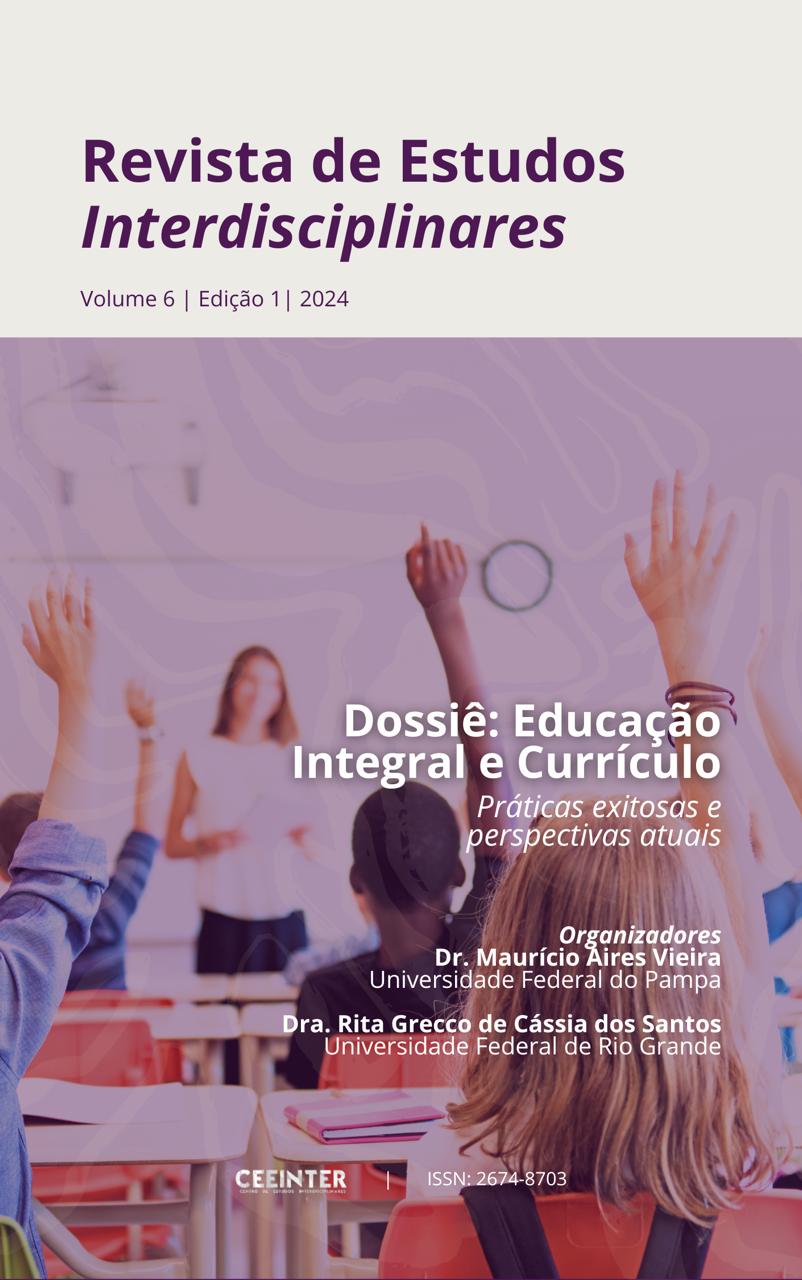EDUCAÇÃO EM TEMPO INTEGRAL
UM ESTUDO DE CASO EM ESCOLA DE ZONA RURAL
Visualizações: 289DOI:
https://doi.org/10.56579/rei.v6i1.1189Keywords:
School in the Countryside, Integral Education, EducationAbstract
This article addresses the policy and experiences of full-time comprehensive education in Brazil and aims to explore the conceptions of teaching quality that permeate policies and initiatives of full-time education and full-time school through articles that debate possible relationships between the expansion length of stay at school and increases in the quality of teaching.
The methodology used is the bibliographic method, which refers to systematic research based on materials published in books, magazines, newspapers, electronic networks, that is, materials accessible to the public. Full-time school is an effective possibility to improve the quality of education, however, it indicates that efforts need to be adopted so that other dimensions of school education are met to strengthen and stimulate the full potential of this educational policy in increasing improvements in the quality of education . As a case study, we followed the EEEF. Cândida Silveira Haubmann, rural, multi-serial school, which has this format, through experiences carried out during participation in the Pedagogical Residency program. In this scenario, we found that the school, being full-time, located in a rural area, has many potentialities to be explored, but it still cannot be considered a full-time education school.
Downloads
References
BRASIL, Lei nº 13.415, de 16 de fevereiro de 2017. Disponível em: <http://www.planalto.gov.br/ccivil_03/_ato2015-2018/2017/lei/l13415.htm>
BRASIL, Portaria nº 727, de 13 de junho de 2017. Disponível em: <http://www.fnde.gov.br/acesso-a-informacao/institucional/legislacao/item/10931-portaria-mec-n%C2%BA-727,-de-13-de-maio-de-2017>.
BRASIL. Ministério da Educação. Portaria Nº 1.144, de 10 de outubro de 2016. Institui o Programa Novo Mais Educação, que visa melhorar a aprendizagem em língua portuguesa e matemática no ensino fundamental. Diário Oficial da União: seção 1, Brasília, DF, n. 196, p. 23, 11 out. 2016.
BRASIL. Constituição Federal de 1988. Promulgada em 5 de outubro de 1988. Disponível em <http://www.planalto.gov.br/ccivil_03/constituicao/constituição.htm>.
BRASIL. Lei no 8.069, de 13 de julho de 1990. Dispõe sobre o Estatuto da Criança e do Adolescente e dá outras providências. Diário Oficial [da] República Federativa do Brasil, Brasília, DF, 16 jul. 1990. Disponível em: <http://www.planalto.gov.br/ccivil_03/LEIS/L8069.htm#art266
BRASIL. LEI nº 9394, de 20.12.96. Estabelece as diretrizes e bases da Educação Nacional, in: Diário da União, ano CXXXIV, nº 248, 23.12.96
BRASIL. MEC. Instituto Nacional de Estudos e Pesquisas Anísio Teixeira – INEP. CENSO ESCOLAR 2016-Notas Estatísticas. Brasília – DF. 2017.
BRASIL. Ministério da Educação. Educação integral: texto referência para o debate nacional. Brasília, DF, 2009b. (Série Mais Educação).
BRASIL. Ministério da Educação. Rede de saberes mais educação: pressupostos para projetos de educação integral. Brasília, DF: MEC, 2009c. (Série Mais Educação).
BRASIL. Ministério da Educação. Secretaria de Educação Básica. Programa Ensino Médio Inovador: Documento Orientador. Brasília: MEC, 2014b.
BRASIL. Portaria nº 970, de 9 de outubro de 2009. Institui o Programa Ensino Médio Inovador. Brasília: Diário Oficial da União: seção 1, Brasília, DF, p. 52-53, 13 out. 2009a.
BRASIL. Portaria Normativa Interministerial nº 17, de 24 de abril de 2007. Institui o Programa Mais Educação, que visa fomentar a educação integral de crianças, adolescentes e jovens, por meio do apoio a atividades socioeducativas no contraturno escolar. Brasília: Ministério da Educação, [2007]. Disponível em: http://portal.mec.gov.br/arquivos/pdf/mais_educacao.pdf.
CARVALHO, Marta Chaves de. A escola, o professor e o aluno de periferia. In: BRASIL. Ministério da Educação. Secretaria de Educação Básica. Professor do Ensino Médio: Formação em Foco. Brasília: MEC/SEB, 2016. p. 25-32.
CAVALIERE, A. M. Tempo de escola e Qualidade na Educação Pública. Educ. Soc., Campinas, vol. 28, n.100 – Especial, p. 1015-1035, out. 2007. Disponível em <http://www.cedes.unicamp.br>.
CAVALIERE, Ana Maria (orgs.). Educação brasileira e(m) tempo integral. Petrópolis, RJ: Vozes, 2002.
CAVALIERE, Ana Maria. Anísio Teixeira e a educação integral. Paidéia, vol. 20, no. 46, maio-ago. 2010.
COELHO, Lígia Marta Coimbra da Costa. História(s) da educação integral. Em Aberto, Brasília, v. 22, n. 80, p. 1-14, abr. 2009.
COELHO, Lígia Martha C. da C. Alunos no Ensino Fundamental, ampliação da jornada escolar e Educação Integral. Educar em Revista, Curitiba, Brasil, n. 45, p. 73-89, jul./set. 2012.
PERRENOUD, Philippe. Dez Novas Competências para Ensinar. Porto Alegre: Artmed, 1999.
GADOTTI, M. Educação Integral no Brasil:inovações em Processo. São Paulo: Editora e Livraria Instituto Paulo Freire, 2009.
GERMANI, Bernadete. Educação em tempo integral: passado e presente na Rede Municipal de Ensino de Curitiba. 108 f. Dissertação (Mestrado em Educação) - Pontifícia Universidade Católica do Paraná, Curitiba, 2006
GUARÁ, I. M. F. Rosa. É imprescindível educar integralmente. Cadernos CENPEC, 2006, nº2.
PINAR, W. F. Currere: aquel primer año. InvestigaciónCualitativa, 2(1) pp. 55-65, 2017.Disponível em: <https://ojs.revistainvestigacioncualitativa.com/index.php/ric/article/view/59.> Acesso em maio de 2023
PINAR, W. F. O que é a Teoria do Currículo? Tradução: BARROS, Ana Paula; PINTO, Sandra; Porto, Portugal: Ed. Porto 2007.
PINAR, W.F. Estudos Curriculares: ensaios selecionados. (seleção, organização e revisão técnica: Alice Casemiro Lopes, Elizabeth Macedo) São Paulo: Cortez, 2016.
UNESCO. Organização das Nações Unidas para Educação, Ciência e Cultura. Educação: um tesouro a descobrir. Relatório para a UNESCO da Comissão Internacional sobre Educação para o século XXI, 2010.

Downloads
Published
How to Cite
Issue
Section
License
Copyright (c) 2024 Interdisciplinary Studies Journal

This work is licensed under a Creative Commons Attribution 4.0 International License.
The Journal of Interdisciplinary Studies adopts the Creative Commons Attribution 4.0 International License (CC BY 4.0), which allows for sharing and adapting the work, including for commercial purposes, provided proper attribution is given and the original publication in this journal is acknowledged.

